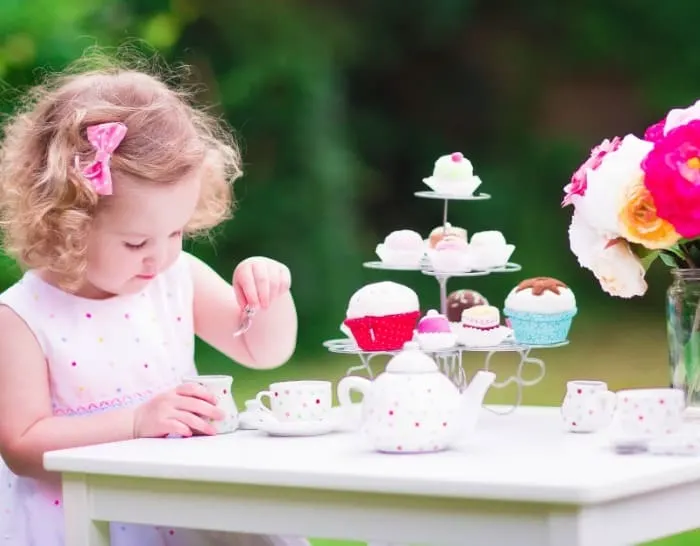Imaginary friends are an extremely healthy part of natural child development. Children may use an imaginary friend to boost their confidence, practice verbal skills, and creative play.
Many parents are familiar with the sounds of their little one talking away to what seems like no one. Only to be told they are talking to their imaginary friend.
Some parents may feel alarmed about this, but the good news is that you shouldn’t be.

WHAT TO DO WHEN YOUR CHILD HAS AN IMAGINARY FRIEND
So what do you do when your child has imaginary friends? Ultimately, nothing.
Since having an imaginary friend is a natural part of child development, there is no reason to be concerned.
While you don’t want to encourage your little one to bring their imaginary friend along with them everywhere they go, make sure you validate your child’s feelings in regards to their “friend”.
This may mean apologizing to their imaginary friends when you accidentally sit on them at the dinner table or forget to leave them a place on the couch.
Our daughter had 3 main imaginary friends when she was young. Now as a pre-teen, she will still sometimes mention them saying things like “Remember when I had those 3 imaginary friends? And how funny their names were?”.

BENEFITS OF IMAGINARY FRIENDS
From now on when you hear your little one chattering away to what seems like thin air, it’s best to just leave it alone. This is because an imaginary friend can have an amazing impact on their development.
BEAT THE BULLY
Imaginary friends can be extremely useful when it comes to boosting your little one’s confidence. Being self-confident can help your child deal with bullies in a more positive way in the future.
BREAK BOREDOM
When your little one has an imaginary friend, they are less likely to experience boredom. Imaginary friends demonstrate your child’s ability to be creative and resourceful on their own.
GIVES THEM A VOICE
Many children will use their imaginary friends to convey a message that they don’t feel they are able to say themselves.
If your child is feeling uncomfortable with something they may use their make-believe friend to tell you about it. This gives them a voice to fall back on when they are feeling uncomfortable.
TAKE CONTROL
Having imaginary friends gives your children an opportunity to tell someone else what to do and use their creativity to get the results they desire.
When challenged to a race, the imaginary friend may always lose. This will help to boost your little one’s confidence.
FILL A VOID
If your little has a desire to have a family pet or sibling, they may create one on their own. An imaginary pet or friend gives your little one the chance to fill a void they may be feeling.
Your child will also develop some important life skills with this new pet or sibling. They will naturally want to take care of them and provide for them.
Your child having an imaginary friend is nothing to be worried about, in fact, it’s a natural part of normal childhood development.
If you find out your little one has invented a make-believe friend, the best thing you can do is accept this stage of life.
You may also like this post HOW TO HELP YOUR CHILD FACE CHALLENGES HEAD ON:

